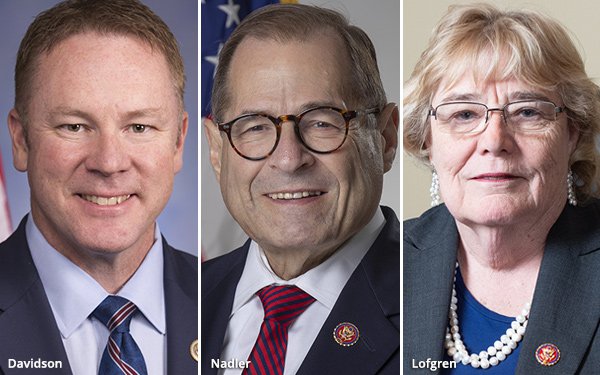
The House Judiciary Committee
on Wednesday advanced a bill that would restrict the government's ability to purchase Americans' data, including information about their online activity, app use and locations.
Thirty
lawmakers on the committee voted in favor of the bill, none voted against it, and one voted “present.”
The Fourth Amendment Is Not For Sale Act, reintroduced last week in the
House, would require law enforcement and intelligence agencies to obtain a court order before buying personal information from data brokers, and also prohibit government agencies from purchasing data
obtained through deception or violations of a privacy policy.
Reps. Warren Davidson (R-Ohio) introduced this year's version of the bill, which is co-sponsored by Reps. Jerrold Nadler (D-New
York), Andy Biggs (R-Arizona), Zoe Lofgren (D-California), Ken Buck (R-Colorado), Pramila Jayapal (D-Washington), Thomas Massie (R-Kentucky) and Sara Jacobs (D-California).
advertisement
advertisement
“When you do
anything that involves the internet, you leave a bread crumb trail of data behind,” Nadler said Wednesday morning at the committee's markup of the bill. “This generates a substantial
amount of personal information -- information that most of us would like to keep private. Certainly we would like to keep it private from companies, but we especially would like to keep our online
habits private form our own government.”
While the bill under discussion would only restrict the government, Nadler also referenced the use of online data for advertising.
“Our lives have moved online and our digital digital footprints are constantly being swept up by internet companies who can sell the information for commercial use in microtargeted
advertisements or the compilation of complex digital profiles,” he said.
He added that while some companies say the data they sell is “de-identified,” and that the
information is never sold to the government, “are not remotely true.”
“Data brokers can reidentify anonymous data,” Nadler said.
Rep. Zoe Lofgren
(D-California)., who spoke in favor of the bill, added that she and other lawmakers are working on a “more significant piece of legislation” that would address broader privacy
concerns.
When the measure was first introduced in the House and Senate in 2021, it was supported by ad industry self-regulatory group Network Advertising Initiative.
“The
nonconsensual sale of consumer data for law enforcement and foreign intelligence purposes is unethical, it poses a serious privacy threat to consumers, and it ultimately threatens the viability of
data-driven advertising,” Leigh Freund, the group's CEO and president, stated in April of 2021.